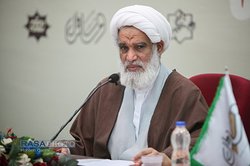 The representative of Khuzestan in the Assembly of Experts said, “The revolutionary seminaries are the seminaries of the era of the Islamic Revolution and the meaning of the seminaries of the era of the Islamic Revolution is the engine of the Islamic Revolution.”
The representative of Khuzestan in the Assembly of Experts said, “The revolutionary seminaries are the seminaries of the era of the Islamic Revolution and the meaning of the seminaries of the era of the Islamic Revolution is the engine of the Islamic Revolution.” RNA – In an exclusive interview with Rasa News Agency, Ayatollah Abbas Ka’bi, the representative of the people of Khuzestan province in the Assembly of Experts, referred to the characteristics of the revolutionary seminary and said, “The Supreme Leader of the Islamic Revolution, Ayatollah Khamenei, in continuation of the efforts of Imam Khomeyni to fulfill the divine mission and goals of the seminaries has chosen the specific concept of the ‘revolutionary seminaries’ as the key term that expresses the mission and goals of the seminaries.”
He added, “In planning, the Supreme Leader took the high-level documents, the vision and plans for the quantitative and qualitative development of the seminaries and the movement of the seminaries into consideration and chose the term ‘revolutionary seminaries,’ which should define the nature of the revolutionary seminaries and express its characteristics.”
Ayatollah Ka’bi stated that the Imam’s lofty vision and leadership in meeting the expectations of the revolutionary seminaries must be fulfilled, saying, “The revolutionary seminaries are the seminaries of the era of the Islamic Revolution and the meaning of the seminaries of the era of the Islamic Revolution is the engine of the Islamic Revolution from the point of view of the epistemological foundations, the movement and guidance of the nation and the pioneer on the scene, the seminaries and the religious authorities (the sources of emulation).”
The teacher in the Seminaries of Qom continued, “Imam Khomeyni, at the level of a warrior source of emulation on the path of God, who had a special interest in the upholding the commandment of God and fighting against the oppressors, used the capacity of the seminaries and clergy to fight against the oppressors and uphold the sacred system of the Islamic Republic. Thus, we have to say that the Islamic Revolution arose from the seminaries.”
He stated the goal of the Islamic Revolution was the rule of religion, the upholding of justice, the establishment of public order based on divine values, the presence of the people on the scene and the realization of the capacities of the Islamic ummah for the realization of modern Islamic civilization and considered religion, leadership and the people as three sides of the Islamic Revolution.
Ayatollah Ka’bi said, “Wilayat al-Faqih (Guardianship of the Jurisprudent) represents the religious leadership of the society and the people as a faith community who believe in Islamic values and the teachings of pure Muhammadan Islam based on the teachings and knowledge of the Ahl al-Bayt as shaping the relationship between the ummah and Imamate. The past forty years have been driven by the guidance and support of the great Wali al-Faqih (Guardian-Jurist), which itself is the product of the Seminaries.”
Rasa News Agency
112/976